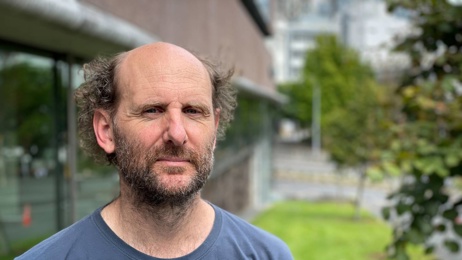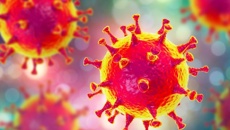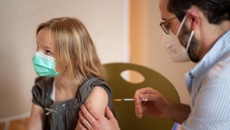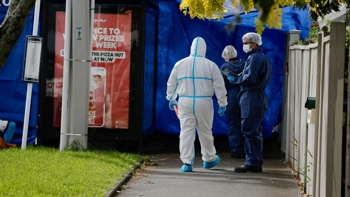There are 21,616 Covid cases in the community today and a record 960 patients in hospital battling the virus.
Two more people have died, the Ministry of Health said today.
One death was in Southern and one in Wellington's Capital & Coast DHBs.
"Both people, one man and one woman, were aged over 70," the ministry said.
This takes the country's death toll since the pandemic began to 117.
Of the 960 people in hospital, 23 are in Northland, 187 in North Shore, 245 Middlemore, 200 in Auckland, 77 in Waikato, 35 in Bay of Plenty, 35 in Lakes, 9 in Tairāwhiti, 23 in Hawke's Bay, 14 in Taranaki,14 in MidCentral, 2 in Whanganui, 22 in Hutt Valley, 33 in Capital and Coast, 7 in Wairarapa, 12 in Nelson Marlborough, 33 in Canterbury, 3 in South Canterbury and 14 in Southern.
Director general of health Dr Ashley Bloomfield said there were 22 people in intensive care or high dependency units today.
Bloomfield said the reason someone was in hospital was determined when they were discharged.
There were three reasons why people were admitted to hospital and had Covid-19.
This included people who had Covid symptoms requiring hospital care, had a pre-existing condition (such as diabetes or heart disease exacerbated by Covid) or were admitted to hospital for another reason, such as an injury, and had Covid.
Bloomfield confirmed that the outbreak in Wellington appeared to still be on the way up.
On rapid antigen tests, he said the limitation of RATs was known and acknowledged people were returning several negative tests and then a positive test.
Some people always returned negative tests but probably did have Covid, he said.
Bloomfield had been "pleasantly surprised" with the number of people reporting their negative and positive results and from tomorrow, the positivity rates via RATs per DHB would be reported.
Genome sequencing could only be done via PCR testing and there were still thousands of these tests done every day.
Case numbers in the Northern region were higher than the peak of 11,000 cases modelled by Te Pūnaha Matatini for the second week of March.
This could be due to the introduction of rapid antigen tests (RATs), he said, and there had been "remarkable" levels of result reporting.
Bloomfield said the peak may have been higher in Auckland because there was a predominance of the sub-variant BA.2.
Areas that had a big initial Omicron outbreak were also getting a second wave with the BA.2 subvariant, he said.
The most important thing anyone could do is make sure they are "vaxxed to the max" and that included getting a booster.
It was clear that being up to date with vaccinations for Omicron increased three doses, he said.
After two doses of the vaccine, effectiveness against getting Omicron and being hospitalised does wane.
A March 8 report from the Northern regions showed that 84 per cent of the people admitted for Covid were not fully boosted.
What doctors know about Long Covid
Ministry of Health chief science adviser Dr Ian Town said most people who got Covid recovered fully.
Symptoms of Long Covid included headaches, low mood, cognitive impairment or brain fog, join pains, ongoing changes to the sense of taste or smell and poor quality of sleep.
Advice on how to recover safely was available on the ministry's website.
On the reports of impact of Long Covid on the brain, Town said research showed there were changes in the brain area related to taste, smell and memory processing.
Around the world, researchers were looking at how to understand these lingering impacts of Long Covid.
The ministry would also fund an study that aimed to understand the experience of those who have had Covid, looking at both the long and short impacts of the virus.
Town said in recovery of infections such as this it was important to take it easy and follow advice of your health practitioner.
Covid-19 was definitely not a disease to be take trivially and just getting it for the sake of getting it may have short and long term consequences.
Despite the apparent flattening of Covid cases in the past week, the number of Covid-related deaths is continuing to climb with yesterday's two new deaths bringing the total to 115.
The number of people in hospital with Covid is also rising, with 952 patients being treated nationwide yesterday.
There were 15,540 new cases in the community yesterday - down from a high of about 24,000.
There is also cautious optimism that Auckland maybe over the worst of the outbreak as the virus continues to spread and impact the rest of the country.
Other regions around the country are already facing record numbers for their regions today.
Christchurch has seen a record 2642 new cases of Covid-19 reported in Canterbury in the past 24 hours.
The Canterbury District Health Board announced the new cases in a post on its Facebook page on Tuesday.
It is the highest number of new cases reported to date, following from the 2260 new cases reported on Friday.
Tairāwhiti has also hit its record number today with 442 new cases including one person in hospital.
"This is the highest daily case total we've had so far, which shows Omicron is still circulating freely in the community," a post on the Hauora Tairāwhiti Facebook page said.
As well as numerous businesses and community facilities being forced to temporarily close due to staff shortages, the virus is now impacting schools, especially in the lower North Island.
Yesterday two Wairarapa schools - St Patrick's School in Masterton and Martinborough School - closed after staff and students were forced to self-isolate and students at a number of Wellington schools are also isolating.
It comes as experts say there needs to be an extra push for people to get the booster as almost 20 per cent of those eligible are still yet to get it.
University of Auckland public health lecturer Collin Tukuitonga told RNZ the word 'booster' could make the dose sound like an optional extra.
"My own view is that we should never have described the two doses as being fully vaxxed," he said.
"Fully vaxxed in my mind for Omicron is the three doses and ... we should be clearer that the booster is essential in ensuring protection from Omicron."
Immunisation Advisory Centre medical director Nikki Turner agreed that all three doses should be considered as one full course of the vaccine. The booster was far more effective at preventing serious illness from Omicron than two doses, she said.
Take your Radio, Podcasts and Music with you









